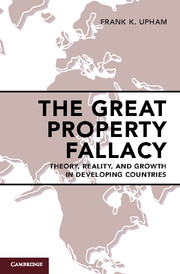Book contents
- Frontmatter
- Dedication
- Contents
- Preface
- Acknowledgments
- 1 Introduction
- 2 Physics Envy: Property Rights in Development Theory
- 3 Property and Markets: England and America
- 4 Property and Politics: Japan
- 5 Law and Development without the Law Part: China
- 6 Theory in Action: Cambodia
- 7 Property Rights and Social Change
- Index
3 - Property and Markets: England and America
Published online by Cambridge University Press: 19 January 2018
- Frontmatter
- Dedication
- Contents
- Preface
- Acknowledgments
- 1 Introduction
- 2 Physics Envy: Property Rights in Development Theory
- 3 Property and Markets: England and America
- 4 Property and Politics: Japan
- 5 Law and Development without the Law Part: China
- 6 Theory in Action: Cambodia
- 7 Property Rights and Social Change
- Index
Summary
In this chapter we examine two case studies of the destruction of property rights in response to market opportunities. The first chronicles three centuries of the English enclosure movement and the incremental elimination of villagers' rights to enter and forage on their lord's land. The second uses an American water law case, Sanderson and Wife v. Pennsylvania Coal Co., to illustrate the nineteenth-century transformation of American property law to accommodate commercialization and industrialization. Both accounts emphasize two aspects of these complicated phenomena, the nature of the interests lost and the role of formal legal institutions in the process of social restructuring. There is no attempt to create a model or derive best practices of market adjustment, but the lessons from these unique events can be applied to seemingly unrelated social phenomena of today. Indeed, the subsequent chapters on the transformation of Japanese, Chinese, and Cambodian property law and social structure will draw heavily on the analysis of what happened centuries earlier on distant continents.
WHEN SHEEP ATE MEN: THE ENGLISH ENCLOSURE MOVEMENT
In 1550, 80 percent of the English population was engaged in agriculture; only 20 percent of those farmers produced for the market; and productivity was so low that the English population had stagnated at six million for centuries. Three centuries later, 80 percent of the population worked off the land, those that farmed were overwhelmingly “businessmen farming for the market,” and the population was approaching 20 million. The most striking aspect of England's agricultural revolution for us, however, is not these statistics, or even the fundamental change in the nature of land ownership that drove them. It is the political and legal process that facilitated the dispossession of an entire class without the widespread violence and disruption that usually accompanies such change.
At the beginning of the sixteenth century, even though the lord of a manor may have owned a parcel of land in a sense approximating our notion of legal title, other village residents, the commoners, had rights to use that land in specific ways that severely limited the lord's power over the land. The result was an agricultural topography that was dramatically different from that of today.
- Type
- Chapter
- Information
- The Great Property FallacyTheory, Reality, and Growth in Developing Countries, pp. 34 - 60Publisher: Cambridge University PressPrint publication year: 2018



